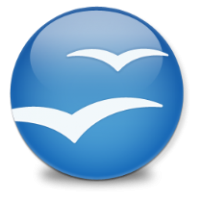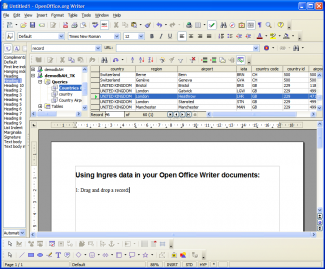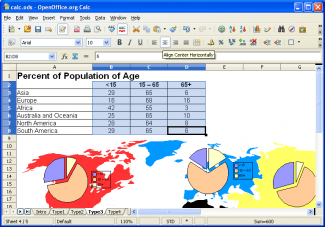Habit Rabbit
LQ: 9.2
Recommended Age: 4+
Skills Used: Focus, Organization, Mathematics, Writing

Open Office is free, open-source software much akin to Microsoft Office, which features a word processor, a formula editor, database manager, as well as presentation and drawing applications. As a highly useful alternative for users who are not comfortable paying for productivity software like Microsoft Office, Open Office offers many of the same conveniences – free of cost. The program can read nearly all file formats, and content can be stored locally. While the software saves texts documents in ODF format, users can easily change the default to .doc, .pdf, or any other format that makes their stored data easiest to transfer. An app-reader can be downloaded from the iTunes and Android app store, too, allowing users to access read-only versions of their saved (and synced) documents. Open Office is best suited for children 8 and older, as it may be a difficult program to navigate for younger users.
Arranging and coordinating materials in order to complete a task.
 Users will find that Open Office helps them keep an organized collection of their past and current work. The word processor program (Writer), functions much like Microsoft Word, allowing users to create text documents, and save them systematically to the computer's local storage. Though it may seem obvious that saving text documents into appropriate subject related folders helps users become more organized, it is an important part of what makes Open Office helpful for introducing good organizational strategies at an early age. Because digital portfolios are increasingly becoming part of classroom routine, and are widely used as a way for school officials to judge and approve the work that students put out, exposing users to work management strategies through Open Office will mold them into well-organized and productive students. The spreadsheet app or "Calc," can be used as more than just a method for organizing finances. A spreadsheet can arrange chores, homework assignments, and weekly obligations - resembling a daily task list. "Impress," a presentation application, helps users to organize their research into a brief, visual presentation, much like Apple's Keynote. Of course, these are only a few ways in which Open Office aids and introduces good organization skills, as this robust, highly functional software, offers a variety of ways for users to become better task managers.
Users will find that Open Office helps them keep an organized collection of their past and current work. The word processor program (Writer), functions much like Microsoft Word, allowing users to create text documents, and save them systematically to the computer's local storage. Though it may seem obvious that saving text documents into appropriate subject related folders helps users become more organized, it is an important part of what makes Open Office helpful for introducing good organizational strategies at an early age. Because digital portfolios are increasingly becoming part of classroom routine, and are widely used as a way for school officials to judge and approve the work that students put out, exposing users to work management strategies through Open Office will mold them into well-organized and productive students. The spreadsheet app or "Calc," can be used as more than just a method for organizing finances. A spreadsheet can arrange chores, homework assignments, and weekly obligations - resembling a daily task list. "Impress," a presentation application, helps users to organize their research into a brief, visual presentation, much like Apple's Keynote. Of course, these are only a few ways in which Open Office aids and introduces good organization skills, as this robust, highly functional software, offers a variety of ways for users to become better task managers.
Developing a systematic approach for setting and achieving goals.
 Templates are an integral part of how users create their work. Templates pre-dispose users to strategies that will give them the foresight to actively plan how they will approach an assignment. For example, when writing an essay, users can open a Venn Diagram template, a graphic organizer that allows users to engage in a comparison and contrast brainstorming activity before starting an essay. Other templates include an exercise chart, or a calendar into which users can input and edit important events - or for more a day-to-day list, a weekly planner template is available. Users can create flashcards to help them study, or make to-do lists, ensuring each day they achieve their productivity goals. Even custom templates can be created to suit users' more specific needs.
Templates are an integral part of how users create their work. Templates pre-dispose users to strategies that will give them the foresight to actively plan how they will approach an assignment. For example, when writing an essay, users can open a Venn Diagram template, a graphic organizer that allows users to engage in a comparison and contrast brainstorming activity before starting an essay. Other templates include an exercise chart, or a calendar into which users can input and edit important events - or for more a day-to-day list, a weekly planner template is available. Users can create flashcards to help them study, or make to-do lists, ensuring each day they achieve their productivity goals. Even custom templates can be created to suit users' more specific needs.
Open Office is a platform for users to practice writing. "Write," the word-processor, affords users with access to word count, spell-check, and text editor features. Editing is an often neglected part of the writing process. Proofreading, making necessary changes, and restructuring assignments turns "B" work into an "A." Spell and grammar check make the editing process less time-consuming, as glaring errors in sentence structure on indicated on the document. Writing on a digital medium also provides users who have poor handwriting, with an alternative to submitting illegible work.
All membership plans come with full access to our entire suite of tools learning guides, and resources. Here are a few of the ones we think you’ll like the most: